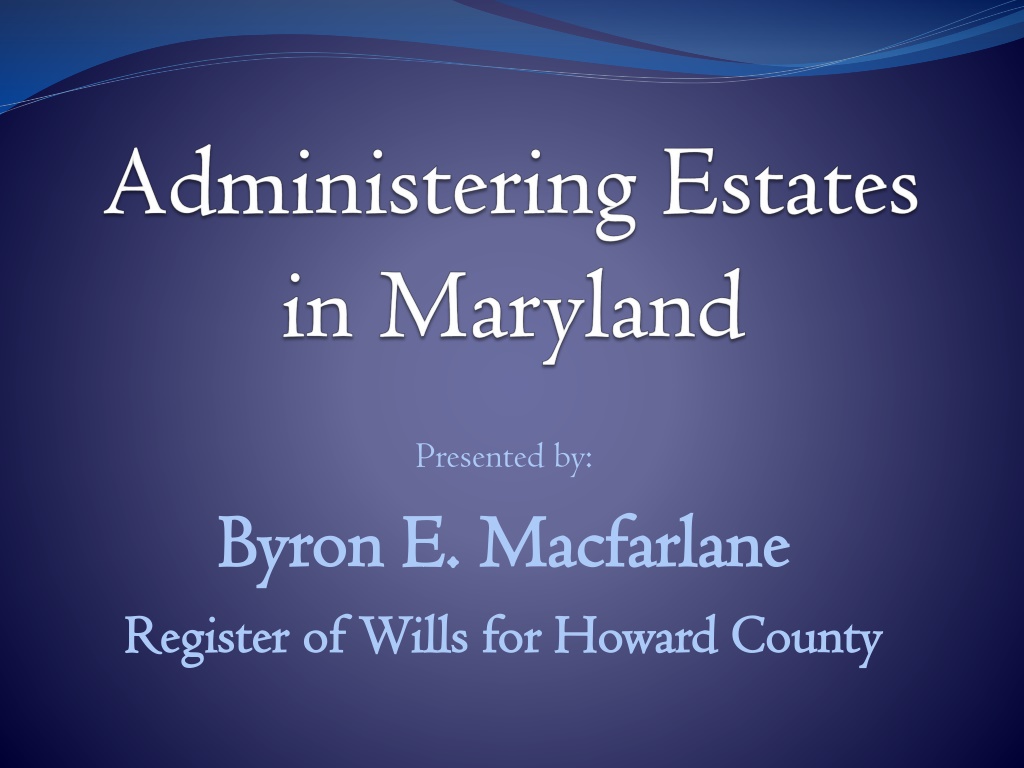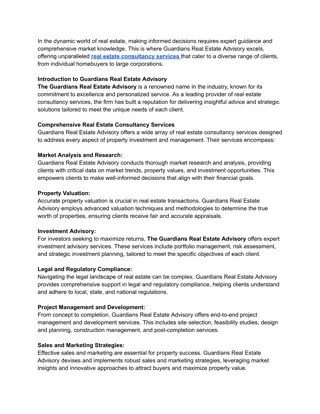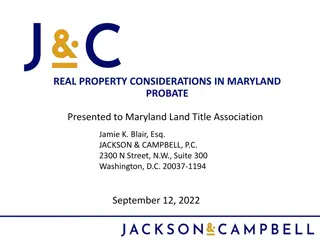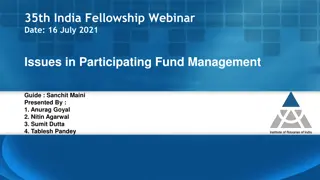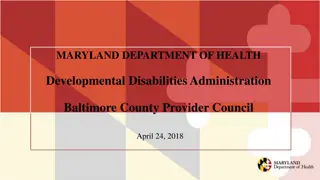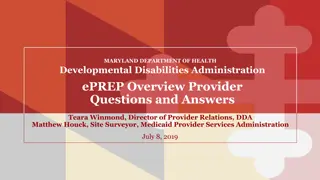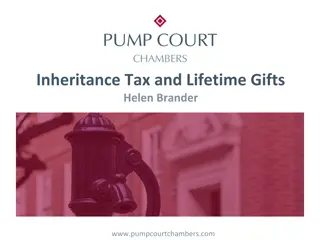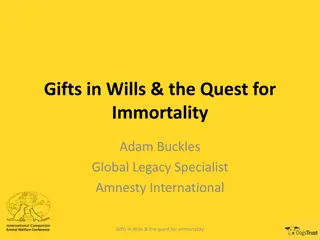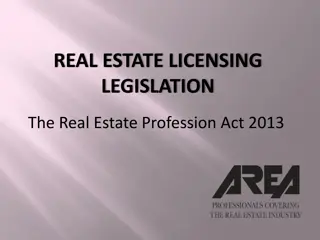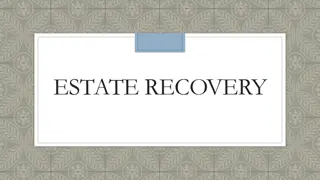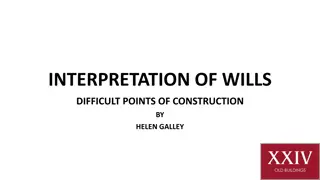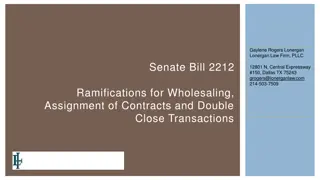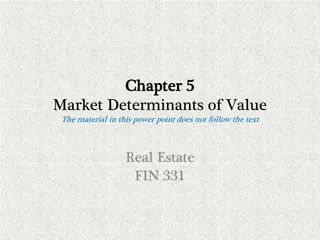Understanding Wills and Estate Administration in Maryland
Explore the significance of wills in Maryland, including the requirements for a valid will, the role it plays in estate distribution, and the various aspects it covers such as appointing a personal representative, property distribution, and more. Gain insights into estate administration processes and legal considerations with expert guidance from Byron E. Macfarlane, the Register of Wills for Howard County.
Download Presentation

Please find below an Image/Link to download the presentation.
The content on the website is provided AS IS for your information and personal use only. It may not be sold, licensed, or shared on other websites without obtaining consent from the author. Download presentation by click this link. If you encounter any issues during the download, it is possible that the publisher has removed the file from their server.
E N D
Presentation Transcript
Presented by: Byron E. Macfarlane Byron E. Macfarlane Register of Wills for Howard County Register of Wills for Howard County
Overview Introduction What is a will? What is an estate? What is estate administration? Where do I go to open an estate? What will I need to open an estate? Will I owe any fees or taxes? Can I see some examples of estates? Wrap-Up
Byron E. Macfarlane Register of Wills Background Howard County Native Attended Howard County public schools University of Maryland, College Park (B.A.) University of Baltimore School of Law (J.D.) Elected 2010, Re-Elected 2014, 2018 Professional Memberships Howard County and Maryland Bar Associations Maryland Register of Wills Association President (2013-2016) Legislative Committee (Past Chair), Automation Committee, and Personnel Committee National College of Probate Judges Outreach Activities Howard County Senior Centers Community & Church Groups Administration of Estates in Maryland Howard Community College (Each Spring & Fall Semester) Wills, Trusts & Estates Howard University School of Law, Spring & Fall 2015
Overview Introduction What is a will? What is an estate? What is estate administration? Where do I go to open an estate? What will I need to open an estate? Will I owe any fees or taxes? Can I see some examples of estates? Wrap-Up
What is a will? A will is one of the most important of all legal documents. It is the declaration of a person s wishes to be carried out after their death. A valid will allows you to do the following: Name a personal representative (P.R.) to administer your estate; Waive the necessity of your P.R. obtaining a surety bond; Specify how you want your property distributed after your death; Make charitable bequests; Disinherit heirs; Create a testamentary trust; Allow for funeral expenses of your estate over $15,000; Provide for the payment of inheritance and other taxes by your estate instead of those taxes being owed by your heirs; and Nominate someone in whom you have confidence to be a guardian of your minor children.
What is a will? In Maryland, a Will must be: 1. in writing; 2. signed by the testator (or by someone else for him/her in his/her presence with his/her permission); 3. attested and signed by at least two credible witnesses in the presence of the testator. The testator must be at least 18 years of age and legally competent at the time of signing.
What is a will? Format Wills do not have to be in any special format so they may be typed or handwritten. Witnesses An competent adult can be a witness to a will in Maryland. Legatees (people who inherit in the will) are not disqualified as witness, and may perform this role. Wills do not need to be notarized, however a notary may serve as one or both witnesses. Validity A will executed in another state will be valid in Maryland if it conformed with the legal requirements of a valid will in the state in which it was executed. Verbal or video wills are not valid in Maryland.
What is a will? Copies of Wills If the original cannot be located, legal presumption that it was revoked. May overcome presumption with the consent of all interested persons (heirs and legatees) and a petition to the orphans court Amending a Will Relatively minor revisions, like changing who is named as P.R. or changing the amount of specific bequests, can be done by executing a codicil , which is an amendment to a will. Same requirements (in writing, signed by testator, two witnesses) as a will. Revoking a Will A will may be revoked by a new will, destruction of the will, or by other writing which conforms to the statutory requirements.
What do I do with my will? You can store it with your personal papers, place it in a Safe Deposit Box, leave it on file with your attorney, or file it for safekeeping with the Register of Wills. Safekeeping of wills is a confidential service, meaning the contents of your will are NOT public record. You may remove your Will at any time, file a new Will or file a Codicil.
What about other planning tools? Four tools in our estate planning toolbox: Last Will and Testament Governs only probate assets (effective after death) Revocable Trust Governs assets re-titled into the trust (effective from creation until a certain event, fixed date, or in perpetuity) Power of Attorney Allows financial or other decision-making during your lifetime when incapacitated (terminates at death) Advance Directive/Living Will Guides medical decisions when incapacitated, also covers funeral directions and organ donation (terminates at death)
Overview Introduction What is a will? What is an estate? What is estate administration? Where do I go to open an estate? What will I need to open an estate? Will I owe any fees or taxes? Can I see some examples of estates? Wrap-Up
What is an estate? An estate is comprised of the property of a decedent. The gross estate of a decedent is determined by including the value at the time of his death of all property, real or personal, tangible or intangible, wherever situated. (26 U.S. Code 2031(a)) The gross estate value is used to determine whether the estate will have any Maryland or Federal estate tax liability. The probate estate of a decedent is determined by assessing the value of all real and personal property of a decedent and any right or interest therein which does not pass, at the time of the decedent s death, to another person by the terms of the instrument under which it is held, or by operation of law. (E&T 1-101(r)) The probate estate assets and values are used to govern the estate administration process in Maryland.
What is the probate estate? The probate estate includes any property or asset held by the decedent in his/her name solely or without a named beneficiary. It is the probate estate that will be subject to estate administration and is governed by a will, if there is one. The probate estate does NOT include property or assets held by the decedent jointly or which has a named beneficiary. The non-probate assets of a decedent will NOT be part of the probate estate and, therefore, NOT included in the administration of an estate.
Probate versus Non-Probate Probate Assets Non-Probate Assets Bank accounts in decedent s name alone Vehicle or boat in decedent s name alone A home or unimproved real property in decedent s name alone Interest in real property as a tenant in common Personal belongings like jewelry and antiques owned solely by the decedent Life insurance policy with no beneficiary Investment accounts, mutual funds, stocks, bonds, and annuities with no beneficiary Refund checks made out to the decedent Joint bank accounts Bank accounts that are payable on death (POD) or transfer on death (TOD) Jointly owned vehicles or those with a named beneficiary A home or unimproved real property held by the decedent and another as joint tenants or tenants by the entireties Personal belongings of the decedent with little to no value Life insurance policy with a named beneficiary Investment accounts, mutual funds, stocks, bonds, and annuities with a named beneficiary Refund checks made out to the decedent and another
Overview Introduction What is a will? What is an estate? What is estate administration? Where do I go to open an estate? What will I need to open an estate? Will I owe any fees or taxes? Can I see some examples of estates? Wrap-Up
What is estate administration? Estate administration is the management of a decedent s assets. This includes the collection of assets and property, payment of expenses and debts, and distribution to the heirs or legatees. The terms estate administration and probate can be used interchangeably.
Who administers the estate and who gets what? An estate is administered by the Personal Representative (P.R.) of the estate. Both who will serve as P.R. and who will inherit from the estate is determined either by the terms of the decedent s will or pursuant to the laws of intestacy. If someone dies with a will (also referred to as dying testate ), the terms of the will indicate who will be appointed P.R. and also indicate how the estate will be distributed. If someone dies without a will (also referred to as dying intestate ), the laws of intestacy determine who has priority to be appointed P.R. and also determines how the estate will be distributed.
Who administers the estate? Will (Testate) No Will (Intestate) The surviving spouse and children of an intestate decedent, or the surviving spouse of a testate decedent; The grandchildren of the decedent who are entitled to share in the estate; The parents of the decedent who are entitled to share in the estate; The brothers and sisters of the decedent who are entitled to share in the estate; Other relations of the decedent who apply for administration; The largest creditor of the decedent who applies for administration; Any other person having a pecuniary interest in the proper administration of the estate of the decedent who applies for administration; or Any other person. 1. 1. The personal representatives named in a will admitted to probate; 2. The personal representatives nominated in accordance with a power conferred in a will admitted to probate; 3. The surviving spouse and children of an intestate decedent, or the surviving spouse of a testate decedent; 4. The residuary legatees; 5. The children of a testate decedent who are entitled to share in the estate. 2. 3. 4. 5. 6. 7. NOTE: If there is no individual who falls within these categories, the priority for appointment of the P.R. will proceed as if the decedent died without a will. 8.
Who gets what? The P.R. is responsible for following a statutory order of payment prior to making distribution to any heirs or legatees: (1) Fees due to the register; (2) Costs and expenses of administration; (3) Funeral expenses; ($15,000 statutory allowance) (4) Compensation of personal representatives , for legal services, and commissions of licensed real estate brokers; (5) Family allowance; ($10,000 statutory allowance for surviving spouse; $5,000 for each unmarried minor child) (6) Taxes due by the decedent; (7) Reasonable medical, hospital, and nursing expenses of the last illness of the decedent; (8) Rent payable by the decedent for not more than three months in arrears; (9) Wages, salaries, or commission for services performed for the decedent within three months prior to death of the decedent; (10) Assistance paid under the Public Assistance to Adults Program; and (11) All other claims.
Who inherits? If the decedent dies without a will (intestate), distribution is determined by the relationship of the surviving heirs to the decedent: Surviving Spouse and Minor Child/Children Spouse receives half of the estate, child/children receive the other half. Surviving Spouse and Adult Child/Children Spouse receives $40,000 plus half of the balance of the estate, adult child/children receive the other half. Surviving Spouse and Parent(s), No Children Spouse receives entire estate if they were married at least five years; if marriage was less than five years spouse receives $40,000 plus half of the balance of the estate, parent(s) receive the other half. Surviving Spouse and No Children or Parents Spouse receives the entire estate. Child/Children and No Surviving Spouse Children receive the entire estate.
Who inherits (contd)? Siblings but No Surviving Spouse, Descendants or Parents Siblings and any children of pre-deceased siblings (nieces and nephews) would receive the entire estate. Aunts/Uncles but No Surviving Spouse, Descendants, Parents or Siblings Aunts/Uncles and any children of pre- deceased siblings (cousins) would receive the entire estate. If none of these relatives are living, then consult a family tree to see who inherits next. Maryland law provides for intestate succession all of the way to the descendants of the decedent s great-grandparents. If there is no surviving spouse and no blood relative as distant as descendants of the decedent s great-grandparents, step-children would inherit. If no step-children, the estate will escheat, or be distributed, to the Board of Education in the jurisdiction where the estate was administered.
Who doesnt inherit? Domestic partners are not entitled to inherit under Maryland intestacy laws. If you have a domestic partner, you would need a Last Will and Testament to provide for them. Since only a spouse, blood relatives, and step-children are provided for by law, charities would not be able to inherit from you. You would need a Will for that. Step-children are last in line to inherit before the estate escheats to the Board of Education. Under Maryland law, a relative as distant as a second cousin five-times removed would inherit before a step-child. You would need a will to provide for them.
Overview Introduction What is a will? What is an estate? What is estate administration? Where do I go to open an estate? What will I need to open an estate? Will I owe any fees or taxes? Can I see some examples of estates? Wrap-Up
Where do I go to open an estate? Estate administration or probate is conducted with the Registers of Wills and Orphans Courts of Maryland. Maryland s judicial branch is generally understood to be comprised of the District and Circuit Courts (trial- level courts), Court of Special Appeals, and Court of Appeals. The Registers of Wills and Orphans Courts handle the probate process almost exclusively, except for complex legal matters and appeals from the Orphans Court that must be heard by the Circuit Court and appellate courts.
The Register of Wills Register in every county and Baltimore City Elected countywide by voters in gubernatorial elections for a 4-year term Full-time position Offices vary in size from 2 to 45 Located in the Circuit Court for each county Clerk for the Orphans Court State agency under the Comptroller Not required to be attorneys
The Orphans' Court Three-judge panel Elected countywide by voters in gubernatorial elections for a 4-year term Part-time in most jurisdictions Most have no dedicated staff and, thus, rely on the Register One judge is appointed Chief Judge by the Governor Adjudicates disputes over estates, judicial appointments of PRs, attorneys fees, and caveats Not required to be attorneys in most jurisdictions Except in Baltimore City, Baltimore County, Prince George s County Circuit Court sits as Orphans' Court in Harford & Montgomery Counties
Overview Introduction What is a will? What is an estate? What is estate administration? Where do I go to open an estate? What will I need to open an estate? Will I owe any fees or taxes? Can I see some examples of estates? Wrap-Up
Opening an Estate - Overview Estate administration can seem overwhelming and extremely complex. The Register of Wills staff help members of the public walk through step by step the process to open and administer an estate. There are basic questions that we ask to determine if you are in the correct jurisdiction and if you need to open an estate.
Opening an Estate Preliminary Questions The first questions we ask are: 1. Was the decedent domiciled in Howard County? If not, the proper venue is probably another county. 2. Did the decedent have a Will? If so, we will then probate the will and appoint the individual(s) named as Personal Representative(s) in the Will. If not, we will proceed with an intestate estate, giving closest relations priority to appointment as Personal Representative. 3. Did the decedent own any assets in his or her name alone or any assets with no named beneficiary? If so, we will need values for each asset at the date of death and proceed with opening an estate. If not, and the decedent died intestate, there is no need to open an estate. If not, and the decedent died testate, our office will open what we call a Will of No Estate. Maryland law requires that a decedent s Last Will and Testament be filed with the Register even if there are no assets to transfer. 1. 1. 2. 1. 2. 3.
What do I do if there is no probate estate? If the decedent died without a will, NOTHING. If the decedent died with a will, file the will with the Register of Wills as a Will of No Estate. Maryland law requires that after being informed of the death of the testator, the custodian of a will must deliver it to the Register of Wills. (E&T 4-202) The will is kept as a custodial matter in the event probate assets of the decedent are later discovered or the decedent is given any inheritance. There is no fee associated with opening a Will of No Estate. There will be no estate to administer.
I need to open an estate what is required? Items you will be required to furnish to open an estate in Maryland: Decedent's Last Will and Testament Death Certificate Funeral Bill Date of death value of assets & debts Held in the decedent's name alone or with no named beneficiary Title to decedent's automobiles and/or other motor vehicles Names and addresses of persons interested in the estate Personal Representative or Nominal Bond Consents to Appointment (if applicable) Any applicable filing fee
Administrative vs. Judicial Probate We proceed with judicial probate when circumstances require a court hearing on the record to determine whether an individual may properly serve as P.R. or if there is serious concern over the validity of a Will Ex. Grandson wishes to be appointed over brother or son Ex. Will offered has defects/unclear
Administering Estates Small Estates (up to $50k/$100k if spouse is the sole heir or legatee) Simple process, no formal accounting required Regular Estates (over $50k/$100k if spouse is the sole heir or legatee) Formal accounting required, subject to Court approval Will of No Estate (MD law requires Will to be filed, not really an estate ) Modified Administration (estate must be solvent, all heirs and legatees must consent) Like a Regular Estate, but only one Final Report is due, approved administratively rather than judicially Final Report must be filed w/in 10 months; 2 90-day extensions permitted
Overview Introduction What is a will? What is an estate? What is estate administration? Where do I go to open an estate? What will I need to open an estate? Will I owe any fees or taxes? Can I see some examples of estates? Wrap-Up
Fees and Taxes Federal Estate Tax ($11.4 million exemption) Collected by the IRS Maryland Estate Tax ($5 million in 2019) Collected by the Comptroller of Maryland Maryland Inheritance Tax (10%) Collected by the Register of Wills Probate Fees & Costs Collected by the Register of Wills
Federal & MD Estate Tax Federal Estate Tax We don t touch it! If you have an estate this large, seek legal counsel. MD Estate Tax The Maryland estate tax is a transfer tax imposed on the transfer of assets from an estate. The tax rate is limited to 16 percent of the amount that the estate value exceeds $4,000,000. This exemption will increase over time. It is based on the maximum credit for state death taxes allowable under 2011 of the Internal Revenue Code. It is calculated by deducting the inheritance tax paid to the Register of Wills from the allowable credit.
Maryland Inheritance Tax The inheritance tax is imposed on the clear value of property that passes from a decedent to some beneficiaries. The tax is levied on property that passes under a will, the intestate laws of succession, and property that passes under a trust, deed, joint ownership, or otherwise. The tax is collected by the Register of Wills located in the county where the decedent either lived or owned property. Inheritance tax rates Property passing to a child or other lineal descendant, spouse of a child or other lineal descendant, spouse, parent, grandparent, stepchild or stepparent, siblings or a corporation having only certain of these persons as stockholders is exempt from taxation. 10 percent on property passing to other individuals. For more information about the inheritance tax, contact the Register of Wills in the appropriate county.
Overview Introduction What is a will? What is an estate? What is estate administration? Where do I go to open an estate? What will I need to open an estate? Will I owe any fees or taxes? Can I see some examples of estates? Wrap-Up
Ex. 1: John Smith Will Heirs & Legatees Assets Heirs: Wife 2 Adult Children Legatees: Wife inherits everything in the will. Checking Account - $1,000 (Wife is beneficiary) Savings Account - $5,000 (Wife is beneficiary) Car - $10,000 (Jointly titled w/ wife) Home - $350,000 (Tenants by the entireties w/ wife) Life Insurance Policy - $100,000 (Wife is beneficiary) 401(k) Retirement Account - $500,000 (Wife is beneficiary)
Ex. 1: John Smith No Will Probate Assets Non-Probate Assets None _________________________ Probate Estate: $0 Checking Account - $1,000 (Wife is beneficiary) Savings Account - $5,000 (Wife is beneficiary) Car - $10,000 (Jointly titled w/ wife) Home - $350,000 (Tenants by the entireties w/ wife) Life Insurance Policy - $100,000 (Wife is beneficiary) 401(k) Retirement Account - $500,000 (Wife is beneficiary) ____________________________ Gross Estate: $966,000
Ex. 1: John Smith No Will What Happens? Wife will file deceased husband s Last Will and Testament with the Register of Wills, complete the two-page Will of No Estate form No estate to probate No fee
Ex. 1: John Smith No Will What Happens to the Non-Probate Assets? Bank Accounts $1,000 and $6,000 Wife takes death certificate to bank, bank issues checks to wife Car - $10,000 (Jointly titled w/ wife) Wife takes death certificate to MVA, removes husband from title, issues new title with the wife s name solely Home - $350,000 (Tenants by the entireties w/ wife) Can record a corrective deed that removes husband s name, but not absolutely necessary Life Insurance Policy - $100,000 (Wife is beneficiary) Wife submits death certificate and required forms to life insurance company, check issued to wife 401(k) Retirement Account - $500,000 (Wife is beneficiary) Wife submits death certificate and required forms to firm, check issued to wife
Ex. 2: John Smith No Will Heirs & Legatees Assets Heirs: Wife 2 Adult Children Legatees: No legatees because he had no will. Checking Account - $1,000 (No beneficiary) Savings Account - $5,000 (No beneficiary) Car - $10,000 (Jointly titled w/ wife) Home - $350,000 (Tenants by the entireties w/ wife) Life Insurance Policy - $100,000 (Wife is beneficiary) 401(k) Retirement Account - $500,000 (Wife is beneficiary)
Ex. 2: John Smith No Will Probate Assets Non-Probate Assets Checking Account - $1,000 (No beneficiary) Savings Account - $5,000 (No beneficiary) _________________________ Probate Estate: $6,000 Car - $10,000 (Jointly titled w/ wife) Home - $350,000 (Tenants by the entireties w/ wife) Life Insurance Policy - $100,000 (Wife is beneficiary) 401(k) Retirement Account - $500,000 (Wife is beneficiary) ____________________________ Gross Estate: $966,000
Ex. 2: John Smith No Will What Happens to the Probate Assets? Wife and two adults children all have priority to serve as Personal Representative, but wife will inherit so she should petition Wife files a small estate petition, is appointed personal representative by the Register of Wills, she is issued two Letters of Administration for the two bank accounts If there are funeral expenses, they should be reported but wife is entitled to a $10,000 family allowance anyway, more than the value of the estate Because the allowances and expenses exceed the value of the estate, the wife will not need to get a nominal bond or publish in the paper Wife pays a $50 small estate fee, no inheritance or estate taxes Wife takes Letters to the bank, closes accounts and inherits the full $6,000
